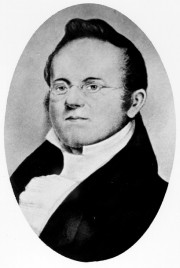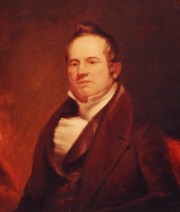(1779-1846) a U.S. Representative, was born in Canterbury, Connecticut on July 31, 1779, then moved in boyhood with his father to Amherst, Massachusetts. He attended the common schools and Williams College, Williamstown, Massachusetts, and was graduated from Brown University in 1804.
Williamson studied law, was admitted to the bar and commenced practice in Bangor in 1807. He was State’s attorney for Hancock County 1808-1815 and postmaster of Bangor 1810-1821.
A member of the Massachusetts Maine State Senate from 1816 until the separation of Maine from Massachusetts in 1820, he served in the Maine State Senate in 1820 and 1821 and was elected its president both years.
As president of the Senate he became Governor upon the resignation of Governor King in 1821. Elected to the Seventeenth Congress (March 4, 1821-March 3, 1823), he was not a candidate for re-nomination in 1822. He served as Judge of Probate for Penobscot County 1824-1840, and bank commissioner 1838-1841.
In 1832 Williamson published The History of the State of Maine; from its first discovery, A. D. 1602, to the separation, A. D. 1820, inclusive. It was published in Hallowell by Glazier Masters & Co. A companion typescript volume, An Index to the Names of White Persons, Indians, Places in The history of the state of Maine . . . ., was created by Stanley B. Atwood, c. 1990.
Williamson died in Bangor May 27, 1846, with interment in Mount Hope Cemetery.
Additional resources
Chase, Henry. Representative Men of Maine.
*Malone, Dumas. “Wiliam Durkee Williamson,” Dictionary of American Biography. New York: Charles Scribner’s Sons, 1933, Vol. 20, pp. 301-302.
*Williamson, Joseph. “Hon. William Durkee Williamson,” Maine Historical and Genealogical Recorder. Bangor, 1888, pp. 73-80.
———————-
*Cited in Friends of the Blaine House at http://blainehouse.org/governors(accessed April 25, 2011)



